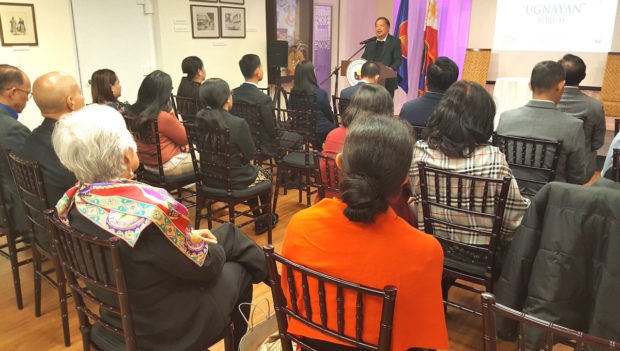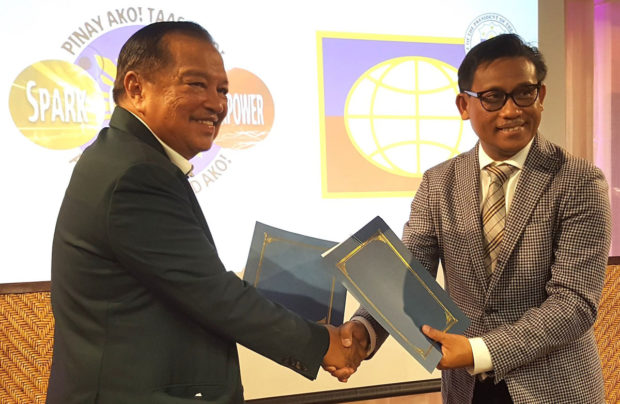Filipinos in U.S. still top contributors to PH economy, says visiting official

The Ugnayan Forum attracted leaders and members of the San Francisco Bay Area community to learn how the Commission on Filipino Overseas can address the concerns of Filipinos abroad. INQUIRER/Jun Nucum
SAN FRANCISCO — Filipinos in the United States continue to be the biggest source of contributions to the Philippine economy, the top official of the Commission on Overseas Filipinos disclosed at a recent forum at the Philippine Consulate.
Visiting Commission on Filipino Overseas (CFO) Chair Francisco Acosta told an Ugnayan Forum with Consul-General Henry Bensurto Jr. that the “total remittances from the United States last year amounted to a total of $32.21 billion, more than P1.6 Trillion or 10% of the country’s Gross Domestic Product (GDP).
“That really contributed a lot to the economy of the Philippines cushioning the impact of the regional and global financial crises and inflation,” announced Acosta, also a former Justice of the Court of Appeals.
Usually referred to as the life blood of the Philippine economy, OFW remittances also were instrumental in pushing the Philippines to become one of the 20 “most progressive countries in the world” with growth rate of 6.2% in October that could grow to 6.7% at the end of the year as Acosta reported.
Created under Batas Pambansa 80, CFO is mandated to advice the President and Congress on matters related to the interest and welfare of Filipinos permanently residing abroad. The Ugnayan, Acosta explained, is held in different countries with big concentration of Filipino immigrants to listen and address issues and concerns affecting overseas Filipinos. Next year, he plans to visit Midwest Seattle, Alaska, New Jersey, Louisiana, Florida, Chicago and New York.
Acosta clarified that the CFO’s mandate is for permanent immigrants who may have naturalized, while the Philippine Overseas Employment Agency (POEA) primarily takes care of overseas Filipino workers’ (OFW) concerns.
As a breakdown of 12 million Filipinos abroad, 41% are OFWs, 48% are permanent immigrants while the rest are the undocumented.
Having been to Guam, Korea, Japan and Hawaii since he started Ugnayan Forum last July, Acosta mentioned that Filipinas in Japan and Korea are the most vulnerable groups of permanent immigrants in the places he visited.
“In order for them to stay in Japan or Korea they have to be married to Japanese or Korean citizens to whom Filipinas usually have whirlwind romances without really knowing each other and have cultural and language differences. Somehow because of their resiliency and the support of other Filipinos who have been there and survived the travails of their marriage,” Acosta assured.
Admitting that many Filipinos still aspire to leave the country for greener pastures, Acosta nevertheless, contended that the number is decreasing because there are now more opportunities for jobs in the Philippines brought about by the massive infrastructure program.
Acosta reported that the poverty and unemployment levels in the Philippines have been reduced, favoring jobseekers who would rather seek employment locally.

Commission on Filipinos Chairman Secretary Francisco Acosta (left) and Philippine Consul-General in San Francisco Henry Bensurto Jr. (right) exchange signed agreements for a “spark, connect and empower” partnership. INQUIRER/Jun Nucum
“Presently, Filipino who work abroad are still subject to abuse through human trafficking where mostly female victims are usually promised to be employed in decent job but end up as sex slaves. To act on this problem, we have the interagency cooperationagainst human,” Acosta said.
Human trafficking, Acosta said, is more prevalent in Korea, and even in the United States where recently some 70 Filipinos promised teaching jobs in Texas and green cards were left to fend for themselves by their Texas school official recruiter who is now in prison for visa fraud.
.
For his part, Con-Gen Bensurto said, “We may lose our new generation of Filipinos as families assimilate new cultures and assume foreign citizenships. Efforts should be made to reach out to these Filipinos and inculcate in them love and appreciation of their Filipino culture and heritage. One cannot love that which one does not know.”
Acosta and Bensurto signed a “spark, connect and empower partnership agreement” in line with the Consulate’s aspiration to elevate the profile and influence Filipinos in the United States.
In the open forum, Elizabeth Engle of Fairbanks, Alaska, home to some 10,000 Filipinos, requested help for their consular needs such as processing passports, dual citizenship applications and signatures for official documents, among others.
“We didn’t get to be part of the so-called consulate-on-wings outreach for the past three years. We request an outreach in Fairbanks so we don’t have to go to Anchorage which is 650 miles away,” Engle pleaded.
.
“Our limited resources make us prioritize their allocation. We initially asked an allocation for 30 consular outreaches but, because of the budget limitation, we only got resources for ten,” Bensurto explained.

